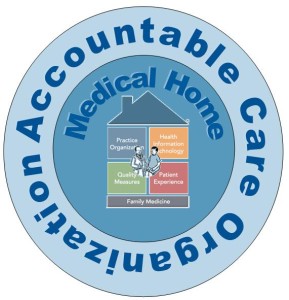Rx For Docs: AMA Answers Obamacare Questions
 As we get closer to 2014, consumers are being surrounded by news coverage, ads and opinions about the health law. And many of them are turning to their doctors for advice. The American Medical Association has a website to help doctors answer frequently asked questions that physicians hear from patients, such as “Why should I care about the health reform law?” (the answer notes that as of Jan. 1, most people will have to have insurance or pay a penalty) and ”Can I keep my own doctor?” (answer: “That depends on the plan you choose… Continue reading
As we get closer to 2014, consumers are being surrounded by news coverage, ads and opinions about the health law. And many of them are turning to their doctors for advice. The American Medical Association has a website to help doctors answer frequently asked questions that physicians hear from patients, such as “Why should I care about the health reform law?” (the answer notes that as of Jan. 1, most people will have to have insurance or pay a penalty) and ”Can I keep my own doctor?” (answer: “That depends on the plan you choose… Continue reading
YouToons Get Ready for Obamacare
2014 is coming–are you ready for Obamacare? Join the YouToons as they walk through the basic changes in the way Americans will get health coverage and what it will cost starting in 2014, when major parts of the Affordable Care Act, also known as “Obamacare,” go into effect.
Written and produced by the Kaiser Family Foundation. Narrated by Charlie Gibson, former anchor of ABC’s World News with Charlie Gibson and a member of the Foundation’s Board of Trustees. Creative production and animation by Free Range Studios.
ACO – the Hottest Three-letter Word in Health Care
 One of the main ways the Affordable Care Act seeks to reduce health care costs is by encouraging doctors, hospitals and other health care providers to form networks to coordinate care better, which could keep costs down.
One of the main ways the Affordable Care Act seeks to reduce health care costs is by encouraging doctors, hospitals and other health care providers to form networks to coordinate care better, which could keep costs down.
To do that, the law is trying a carrot-and-stick approach in the Medicare program: Accountable Care Organizations. ACOs have become one of the most talked about new ideas in Obamacare. Providers get get paid more if they keep their patients well. About four million Medicare beneficiaries are now in an ACO, and, combined with the private sector, more than 428 hospitals have already signed up. An estimated 14 percent of the U.S. population is now being served by an ACO. You may even be in one and not know it.
While ACOs are touted as a way to help fix an inefficient payment system that rewards more, not better, care, some economists warn they could lead to greater consolidation in the health care industry, which could allow some providers to charge more, if they’re the only game in town.
Health Law Won’t Bring Prices Down For Patients
 At a Capitol Hill hearing in June 2013, journalist Steven Brill, who examined the issue of the high cost of health care in a much quoted March 2013 Time magazine article, told Senate Finance Committee members that President Barack Obama’s health care law will do very little to lower prices for consumers.
At a Capitol Hill hearing in June 2013, journalist Steven Brill, who examined the issue of the high cost of health care in a much quoted March 2013 Time magazine article, told Senate Finance Committee members that President Barack Obama’s health care law will do very little to lower prices for consumers.
Joined by a panel of health policy experts at the hearing to explore ways to make health pricing more transparent, Brill said that while he views efforts to disseminate prices for health services to consumers favorably, he believes that increasing transparency has its limits. “[Transparency] starts the conversation… Continue reading
Medicare Spending Variations in States
 The idea that uneven Medicare health care spending around the country is due to wasteful practices and overtreatment—a concept that influenced the federal health law – took another hit in a study published in May 2013. The paper concludes that health differences around the country explain between 75 percent and 85 percent of the cost variations.
The idea that uneven Medicare health care spending around the country is due to wasteful practices and overtreatment—a concept that influenced the federal health law – took another hit in a study published in May 2013. The paper concludes that health differences around the country explain between 75 percent and 85 percent of the cost variations.
“People really are sicker in some parts of the country,” said Dr. Patrick Romano, one of the authors.
That’s a sour assessment for those hoping to wring large savings out of the health care system by making it more efficient. Some, such as… Continue reading
Value and Quality – Not Volume
 For decades, reformers of U.S. healthcare have sought to change how doctors and hospitals are paid to reward quality and efficiency – efforts that accelerated as a result of the Obama health care overhaul. But surprisingly little progress has been made to date, a consortium of large employers reported in March 2013.
For decades, reformers of U.S. healthcare have sought to change how doctors and hospitals are paid to reward quality and efficiency – efforts that accelerated as a result of the Obama health care overhaul. But surprisingly little progress has been made to date, a consortium of large employers reported in March 2013.
Only 10.9 percent of health care spending last year by employer-sponsored plans was based on “value,” as opposed to “volume,” or the number of services performed, according to the study by Catalyst for Payment Reform (CPR), a nonprofit group which represents 21 U.S. employers, including Verizon, Walmart,… Continue reading
Curbing Healthcare Costs is Doctors’ Job
 There is a lot of talk about healthcare cost reduction. In recent years, consumers have increasingly been encouraged by employers and insurers to help control rising health care costs by avoiding unnecessary tests, buying generic drugs and reducing visits to the emergency room, among other things. The hope is that a patient better educated and more engaged in health decisions will choose options that will promote better health and decrease costs.
There is a lot of talk about healthcare cost reduction. In recent years, consumers have increasingly been encouraged by employers and insurers to help control rising health care costs by avoiding unnecessary tests, buying generic drugs and reducing visits to the emergency room, among other things. The hope is that a patient better educated and more engaged in health decisions will choose options that will promote better health and decrease costs.
Such “patient engagement” efforts assume that patients welcome the opportunity – or at least are willing – to get more involved in their own care. But as a study… Continue reading

